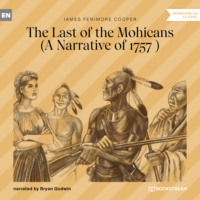
Полная версия
The Deerslayer
"Which is the reason that you always come back? Nothing is ever made more sure by swearing about it."
"Ah, Deerslayer, you are a novelty in these particulars; keeping as true to education as if you had never left the settlements. With me the case is different, and I never want to clinch an idee, that I do not feel a wish to swear about it. If you know'd all that I know consarning Judith, you'd find a justification for a little cussing. Now, the officers sometimes stray over to the lake, from the forts on the Mohawk, to fish and hunt, and then the creatur' seems beside herself! You can see in the manner which she wears her finery, and the airs she gives herself with the gallants."
"That is unseemly in a poor man's darter," returned Deerslayer gravely, "the officers are all gentry, and can only look on such as Judith with evil intentions."
"There's the unsartainty, and the damper! I have my misgivings about a particular captain, and Jude has no one to blame but her own folly, if I'm right. On the whole, I wish to look upon her as modest and becoming, and yet the clouds that drive among these hills are not more unsartain. Not a dozen white men have ever laid eyes upon her since she was a child, and yet her airs, with two or three of these officers, are extinguishers!"
"I would think no more of such a woman, but turn my mind altogether to the forest; that will not deceive you, being ordered and ruled by a hand that never wavers."
"If you know'd Judith, you would see how much easier it is to say this than it would be to do it. Could I bring my mind to be easy about the officers, I would carry the gal off to the Mohawk by force, make her marry me in spite of her whiffling, and leave old Tom to the care of Hetty, his other child, who, if she be not as handsome or as quick-witted as her sister, is much the most dutiful."
"Is there another bird in the same nest!" asked Deerslayer, raising his eyes with a species of half-awakened curiosity, "the Delawares spoke to me only of one."
"That's nat'ral enough, when Judith Hutter and Hetty Hutter are in question. Hetty is only comely, while her sister, I tell thee, boy, is such another as is not to be found atween this and the sea: Judith is as full of wit, and talk, and cunning, as an old Indian orator, while poor Hetty is at the best but 'compass' meant us."
"Anan?" inquired, again, the Deerslayer.
"Why, what the officers call 'compass meant us,' which I understand to signify that she means always to go in the right direction, but sometimes does not know how. 'Compass'for the p'int, and 'meant us' for the intention. No, poor Hetty is what I call on the verge of ignorance, and sometimes she stumbles on one side of the line, and sometimes on t'other."
"Them are beings that the Lord has in his special care," said Deerslayer, solemnly; "for he looks carefully to all who fall short of their proper share of reason. The red-skins honor and respect them who are so gifted, knowing that the Evil Spirit delights more to dwell in an artful body, than in one that has no cunning to work upon."
"I'll answer for it, then, that he will not remain long with poor Hetty; for the child is just 'compass meant us,' as I have told you. Old Tom has a feeling for the gal, and so has Judith, quick-witted and glorious as she is herself; else would I not answer for her being altogether safe among the sort of men that sometimes meet on the lake shore."
"I thought this water an unknown and little-frequented sheet," observed the Deerslayer, evidently uneasy at the idea of being too near the world.
"It's all that, lad, the eyes of twenty white men never having been laid on it; still, twenty true-bred frontiersmen—hunters and trappers, and scouts, and the like,—can do a deal of mischief if they try. 'T would be an awful thing to me, Deerslayer, did I find Judith married, after an absence of six months!"
"Have you the gal's faith, to encourage you to hope otherwise?"
"Not at all. I know not how it is: I'm good-looking, boy,—that much I can see in any spring on which the sun shines,—and yet I could not get the hussy to a promise, or even a cordial willing smile, though she will laugh by the hour. If she has dared to marry in my absence, she'd be like to know the pleasures of widowhood afore she is twenty!"
"You would not harm the man she has chosen, Hurry, simply because she found him more to her liking than yourself!"
"Why not! If an enemy crosses my path, will I not beat him out of it! Look at me! am I a man like to let any sneaking, crawling, skin-trader get the better of me in a matter that touches me as near as the kindness of Judith Hutter! Besides, when we live beyond law, we must be our own judges and executioners. And if a man should be found dead in the woods, who is there to say who slew him, even admitting that the colony took the matter in hand and made a stir about it?"
"If that man should be Judith Hutter's husband, after what has passed, I might tell enough, at least, to put the colony on the trail."
"You!—half-grown, venison-hunting bantling! You dare to think of informing against Hurry Harry in so much as a matter touching a mink or a woodchuck!"
"I would dare to speak truth, Hurry, consarning you or any man that ever lived."
March looked at his companion, for a moment, in silent amazement; then seizing him by the throat with both hands, he shook his comparatively slight frame with a violence that menaced the dislocation of some of the bones. Nor was this done jocularly, for anger flashed from the giant's eyes, and there were certain signs that seemed to threaten much more earnestness than the occasion would appear to call for. Whatever might be the real intention of March, and it is probable there was none settled in his mind, it is certain that he was unusually aroused; and most men who found themselves throttled by one of a mould so gigantic, in such a mood, and in a solitude so deep and helpless, would have felt intimidated, and tempted to yield even the right. Not so, however, with Deerslayer. His countenance remained unmoved; his hand did not shake, and his answer was given in a voice that did not resort to the artifice of louder tones, even by way of proving its owner's resolution.
"You may shake, Hurry, until you bring down the mountain," he said quietly, "but nothing beside truth will you shake from me. It is probable that Judith Hutter has no husband to slay, and you may never have a chance to waylay one, else would I tell her of your threat, in the first conversation I held with the gal."
March released his grip, and sat regarding the other in silent astonishment.
"I thought we had been friends," he at length added; "but you've got the last secret of mine that will ever enter your ears."
"I want none, if they are to be like this. I know we live in the woods, Hurry, and are thought to be beyond human laws,—and perhaps we are so, in fact, whatever it may be in right,—but there is a law and a law-maker, that rule across the whole continent. He that flies in the face of either need not call me a friend."
"Damme, Deerslayer, if I do not believe you are at heart a Moravian, and no fair-minded, plain-dealing hunter, as you've pretended to be!"
"Fair-minded or not, Hurry, you will find me as plaindealing in deeds as I am in words. But this giving way to sudden anger is foolish, and proves how little you have sojourned with the red man. Judith Hutter no doubt is still single, and you spoke but as the tongue ran, and not as the heart felt. There's my hand, and we will say and think no more about it."
Hurry seemed more surprised than ever; then he burst forth in a loud, good-natured laugh, which brought tears to his eyes. After this he accepted the offered hand, and the parties became friends.
"'T would have been foolish to quarrel about an idee," March cried, as he resumed his meal, "and more like lawyers in the towns than like sensible men in the woods. They tell me, Deerslayer, much ill-blood grows out of idees among the people in the lower counties, and that they sometimes get to extremities upon them."
"That do they,-that do they; and about other matters that might better be left to take care of themselves. I have heard the Moravians say that there are lands in which men quarrel even consarning their religion; and if they can get their tempers up on such a subject, Hurry, the Lord have Marcy on 'em. Howsoever, there is no occasion for our following their example, and more especially about a husband that this Judith Hutter may never see, or never wish to see. For my part, I feel more cur'osity about the feeble-witted sister than about your beauty. There's something that comes close to a man's feelin's, when he meets with a fellow-creatur' that has all the outward show of an accountable mortal, and who fails of being what he seems, only through a lack of reason. This is bad enough in a man, but when it comes to a woman, and she a young, and maybe a winning creatur' it touches all the pitiful thoughts his natur' has. God knows, Hurry, that such poor things be defenceless enough with all their wits about 'em; but it's a cruel fortun' when that great protector and guide fails 'em."
"Hark, Deerslayer,—you know what the hunters, and trappers, and peltry-men in general be; and their best friends will not deny that they are headstrong and given to having their own way, without much bethinking 'em of other people's rights or feelin's,—and yet I don't think the man is to be found, in all this region, who would harm Hetty Hutter, if he could; no, not even a red-skin."
"Therein, fri'nd Hurry, you do the Delawares, at least, and all their allied tribes, only justice, for a red-skin looks upon a being thus struck by God's power as especially under his care. I rejoice to hear what you say, however, I rejoice to hear it; but as the sun is beginning to turn towards the afternoon's sky, had we not better strike the trail again, and make forward, that we may get an opportunity of seeing these wonderful sisters?"
Harry March giving a cheerful assent, the remnants of the meal were soon collected; then the travelers shouldered their packs, resumed their arms, and, quitting the little area of light, they again plunged into the deep shadows of the forest.
Chapter II.
Our two adventurers had not far to go. Hurry knew the direction, as soon as he had found the open spot and the spring, and he now led on with the confident step of a man assured of his object. The forest was dark, as a matter of course, but it was no longer obstructed by underbrush, and the footing was firm and dry. After proceeding near a mile, March stopped, and began to cast about him with an inquiring look, examining the different objects with care, and occasionally turning his eyes on the trunks of the fallen trees, with which the ground was well sprinkled, as is usually the case in an American wood, especially in those parts of the country where timber has not yet become valuable.
"This must be the place, Deerslayer," March at length observed; "here is a beech by the side of a hemlock, with three pines at hand, and yonder is a white birch with a broken top; and yet I see no rock, nor any of the branches bent down, as I told you would be the case."
"Broken branches are onskilful landmarks, as the least exper'enced know that branches don't often break of themselves," returned the other; "and they also lead to suspicion and discoveries. The Delawares never trust to broken branches, unless it is in friendly times, and on an open trail. As for the beeches, and pines, and hemlocks, why, they are to be seen on all sides of us, not only by twos and threes, but by forties, and fifties, and hundreds."
"Very true, Deerslayer, but you never calculate on position. Here is a beech and a hemlock—"
"Yes, and there is another beech and a hemlock, as loving as two brothers, or, for that matter, more loving than some brothers; and yonder are others, for neither tree is a rarity in these woods. I fear me, Hurry, you are better at trapping beaver and shooting bears, than at leading on a blindish sort of a trail. Ha! there's what you wish to find, a'ter all!"
"Now, Deerslayer, this is one of your Delaware pretensions, for hang me if I see anything but these trees, which do seem to start up around us in a most onaccountable and perplexing manner."
"Look this a way, Hurry—here, in a line with the black oak-don't you see the crooked sapling that is hooked up in the branches of the bass-wood, near it? Now, that sapling was once snow-ridden, and got the bend by its weight; but it never straightened itself, and fastened itself in among the bass-wood branches in the way you see. The hand of man did that act of kindness for it."
"That hand was mine!" exclaimed Hurry; "I found the slender young thing bent to the airth, like an unfortunate creatur' borne down by misfortune, and stuck it up where you see it. After all, Deerslayer, I must allow, you're getting to have an oncommon good eye for the woods!"
"'Tis improving, Hurry—'tis improving I will acknowledge; but 'tis only a child's eye, compared to some I know. There's Tamenund, now, though a man so old that few remember when he was in his prime, Tamenund lets nothing escape his look, which is more like the scent of a hound than the sight of an eye. Then Uncas, the father of Chingachgook, and the lawful chief of the Mohicans, is another that it is almost hopeless to pass unseen. I'm improving, I will allow—I'm improving, but far from being perfect, as yet."
"And who is this Chingachgook, of whom you talk so much, Deerslayer!" asked Hurry, as he moved off in the direction of the righted sapling; "a loping red-skin, at the best, I make no question."
"Not so, Hurry, but the best of loping red-skins, as you call 'em. If he had his rights, he would be a great chief; but, as it is, he is only a brave and just-minded Delaware; respected, and even obeyed in some things,'tis true, but of a fallen race, and belonging to a fallen people. Ah! Harry March, 'twould warm the heart within you to sit in their lodges of a winter's night, and listen to the traditions of the ancient greatness and power of the Mohicans!"
"Harkee, fri'nd Nathaniel," said Hurry, stopping short to face his companion, in order that his words might carry greater weight with them, "if a man believed all that other people choose to say in their own favor, he might get an oversized opinion of them, and an undersized opinion of himself. These red-skins are notable boasters, and I set down more than half of their traditions as pure talk."
"There is truth in what you say, Hurry, I'll not deny it, for I've seen it, and believe it. They do boast, but then that is a gift from natur'; and it's sinful to withstand nat'ral gifts. See; this is the spot you come to find!" This remark cut short the discourse, and both the men now gave all their attention to the object immediately before them. Deerslayer pointed out to his companion the trunk of a huge linden, or bass-wood, as it is termed in the language of the country, which had filled its time, and fallen by its own weight. This tree, like so many millions of its brethren, lay where it had fallen, and was mouldering under the slow but certain influence of the seasons. The decay, however, had attacked its centre, even while it stood erect in the pride of vegetation, bellowing out its heart, as disease sometimes destroys the vitals of animal life, even while a fair exterior is presented to the observer. As the trunk lay stretched for near a hundred feet along the earth, the quick eye of the hunter detected this peculiarity, and from this and other circumstances, he knew it to be the tree of which March was in search.
"Ay, here we have what we want," cried Hurry, looking in at the larger end of the linden; "everything is as snug as if it had been left in an old woman's cupboard. Come, lend me a hand, Deerslayer, and we'll be afloat in half an hour."
At this call the hunter joined his companion, and the two went to work deliberately and regularly, like men accustomed to the sort of thing in which they were employed. In the first place, Hurry removed some pieces of bark that lay before the large opening in the tree, and which the other declared to be disposed in a way that would have been more likely to attract attention than to conceal the cover, had any straggler passed that way. The two then drew out a bark canoe, containing its seats, paddles, and other appliances, even to fishing-lines and rods. This vessel was by no means small; but such was its comparative lightness, and so gigantic was the strength of Hurry, that the latter shouldered it with seeming ease, declining all assistance, even in the act of raising it to the awkward position in which he was obliged to hold it.
"Lead ahead, Deerslayer," said March, "and open the bushes; the rest I can do for myself."
The other obeyed, and the men left the spot, Deerslayer clearing the way for his companion, and inclining to the right or to the left, as the latter directed. In about ten minutes they both broke suddenly into the brilliant light of the sun, on a low gravelly point, that was washed by water on quite half its outline.
An exclamation of surprise broke from the lips of Deerslayer, an exclamation that was low and guardedly made, however, for his habits were much more thoughtful and regulated than those of the reckless Hurry, when on reaching the margin of the lake, he beheld the view that unexpectedly met his gaze. It was, in truth, sufficiently striking to merit a brief description. On a level with the point lay a broad sheet of water, so placid and limpid that it resembled a bed of the pure mountain atmosphere, compressed into a setting of hills and woods. Its length was about three leagues, while its breadth was irregular, expanding to half a league, or even more, opposite to the point, and contracting to less than half that distance, more to the southward. Of course, its margin was irregular, being indented by bays, and broken by many projecting, low points. At its northern, or nearest end, it was bounded by an isolated mountain, lower land falling off east and west, gracefully relieving the sweep of the outline. Still the character of the country was mountainous; high hills, or low mountains, rising abruptly from the water, on quite nine tenths of its circuit. The exceptions, indeed, only served a little to vary the scene; and even beyond the parts of the shore that were comparatively low, the background was high, though more distant.
But the most striking peculiarities of this scene were its solemn solitude and sweet repose. On all sides, wherever the eye turned, nothing met it but the mirror-like surface of the lake, the placid view of heaven, and the dense setting of woods. So rich and fleecy were the outlines of the forest, that scarce an opening could be seen, the whole visible earth, from the rounded mountain-top to the water's edge, presenting one unvaried hue of unbroken verdure. As if vegetation were not satisfied with a triumph so complete, the trees overhung the lake itself, shooting out towards the light; and there were miles along its eastern shore, where a boat might have pulled beneath the branches of dark Rembrandt-looking hemlocks, "quivering aspens," and melancholy pines. In a word, the hand of man had never yet defaced or deformed any part of this native scene, which lay bathed in the sunlight, a glorious picture of affluent forest grandeur, softened by the balminess of June, and relieved by the beautiful variety afforded by the presence of so broad an expanse of water.
"This is grand!—'tis solemn!—'tis an edication of itself, to look upon!" exclaimed Deerslayer, as he stood leaning on his rifle, and gazing to the right and left, north and south, above and beneath, in whichever direction his eye could wander; "not a tree disturbed even by red-skin hand, as I can discover, but everything left in the ordering of the Lord, to live and die according to his own designs and laws! Hurry, your Judith ought to be a moral and well disposed young woman, if she has passed half the time you mention in the centre of a spot so favored."
"That's naked truth; and yet the gal has the vagaries. All her time has not been passed here, howsoever, old Tom having the custom, afore I know'd him, of going to spend the winters in the neighborhood of the settlers, or under the guns of the forts. No, no, Jude has caught more than is for her good from the settlers, and especially from the gallantifying officers."
"If she has—if she has, Hurry, this is a school to set her mind right ag'in. But what is this I see off here, abreast of us, that seems too small for an island, and too large for a boat, though it stands in the midst of the water!
"Why, that is what these galantine gentry from the forts call Muskrat Castle; and old Tom himself will grin at the name, though it bears so hard on his own natur' and character. 'Tis the stationary house, there being two; this, which never moves, and the other, that floats, being sometimes in one part of the lake and sometimes in another. The last goes by the name of the ark, though what may be the meaning of the word is more than I can tell you."
"It must come from the missionaries, Hurry, whom I have heard speak and read of such a thing. They say that the 'arth was once covered with water, and that Noah, with his children, was saved from drowning by building a vessel called an ark, in which he embarked in season. Some of the Delawares believe this tradition, and some deny it; but it behooves you and me, as white men born, to put our faith in its truth. Do you see anything of this ark?"
"'Tis down south, no doubt, or anchored in some of the bays. But the canoe is ready, and fifteen minutes will carry two such paddles as your'n and mine to the castle."
At this suggestion, Deerslayer helped his companion to place the different articles in the canoe, which was already afloat. This was no sooner done than the two frontiermen embarked, and by a vigorous push sent the light bark some eight or ten rods from the shore. Hurry now took the seat in the stern, while Deerslayer placed himself forward, and by leisurely but steady strokes of the paddles, the canoe glided across the placid sheet, towards the extraordinary-looking structure that the former had styled Muskrat Castle. Several times the men ceased paddling, and looked about them at the scene, as new glimpses opened from behind points, enabling them to see farther down the lake, or to get broader views of the wooded mountains. The only changes, however, were in the new forms of the hills, the varying curvature of the bays, and the wider reaches of the valley south; the whole earth apparently being clothed in a gala-dress of leaves.
"This is a sight to warm the heart!" exclaimed Deerslayer, when they had thus stopped for the fourth or fifth time; "the lake seems made to let us get an insight into the noble forests; and land and water alike stand in the beauty of God's providence! Do you say, Hurry, that there is no man who calls himself lawful owner of all these glories?"
"None but the King, lad. He may pretend to some right of that natur', but he is so far away that his claim will never trouble old Tom Hutter, who has got possession, and is like to keep it as long as his life lasts. Tom is no squatter, not being on land; I call him a floater."
"I invy that man! I know it's wrong, and I strive ag'in the feelin', but I invy that man! Don't think, Hurry, that I'm consorting any plan to put myself in his moccasins, for such a thought doesn't harbor in my mind; but I can't help a little invy! 'Tis a nat'ral feelin', and the best of us are but nat'ral, a'ter all, and give way to such feelin's at times."
"You've only to marry Hetty to inherit half the estate," cried Hurry, laughing; "the gal is comely; nay, if it wasn't for her sister's beauty she would be even handsome; and then her wits are so small that you may easily convart her into one of your own way of thinking, in all things. Do you take Hetty off the old fellow's hands, and I'll engage he'll give you an interest in every deer you can knock over within five miles of his lake."






